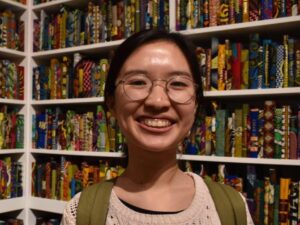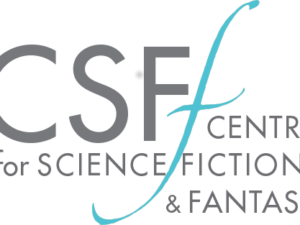
This summer, we are running features of our PhD students busy researching various facets of Science Fiction and Fantasy. Our first PhD student profile is of Christopher Owen.
Tell us about your research.
My doctoral research investigates the representation and narratological function of systemic oppression in the fictional worlds of contemporary science fiction and fantasy novels for a target market of children aged seven through thirteen. By systemic oppression I refer to the holistic combination of social, political, economic, and institutional forms of oppression in all its interlocking and intersecting forms. The hierarchies and norms established and enforced by the chain and circulation of power by social institutions, networks, and groups unfairly disadvantage certain social groups socially, psychologically, economically, and materially so that access to opportunities are (often invisibly) made more accessible to the socially privileged. Systemic oppression can be understood as the social structures that provide ease or limitations for one’s access to opportunities, whether that opportunity is social respect and value or institutional and economic gain.
My project aims to add further insights to current discussions regarding diversity and social justice literature for young readers. In order to distinguish between the forms of oppression a text critiques and those it accepts as natural and normal, my research offers a method for identifying and critiquing the representation of systemic oppression in fictional contexts. To do so, I employ Black Feminist criticism in the analysis of over one hundred Anglophone middle-grade fantastika novels published in the first twenty years of the twenty-first century. Patricia Hill Collins’ theory of the matrix of domination, a theoretical approach to the differing domains of power in a system of oppression, is the foundational framework that informs my work.
I argue that a fictional world’s ability to construct familiar social structures in new and innovative ways offers scholars the opportunity to analyze and understand the organization, management, justification, and experiences of oppression in different contexts. This allows for an understanding of oppression outside of the examples found in the scholar’s own particular context. From here, narratological and rhetorical studies of literature can better develop nuanced arguments regarding oppression and oppressed characters.
My research emphasizes the significant necessity of intersectionality theory, both in the writing and reading of literature. Ostensible narratives of social justice risk contributing to systemic oppression when they do not critique the harms of oppression in all its intersecting forms. By employing an intersectional approach, my research distinguishes between diverse and progressive texts that still maintain the status quo, and those that promote liberating, systemic upheaval.
What was your introduction to SFF?/How did you come to SFF?
I grew up in a rural town in Southern Ontario, Canada, where almost all of my peers either lived and worked on a farm, or played copious amounts of hockey. As an openly nerdy and secretly queer child, anything outdoors or athletic was of zero interest to me. So, instead, I stayed inside with my books. And while I read a variety of things, I have always been drawn to SFF novels. My favourites growing up included J.M. Barrie’s Peter Pan, C.S. Lewis’ The Chronicles of Narnia, and K.A. Applegate’s Animorphs. I think I probably felt like these books were a great escape from my less-than-ideal circumstances.
When I started my Bachelor of Arts in English Literature degree at Wilfrid Laurier University, I was living as an out and proud gay man for the first time. It was during this time that I was reading a lot of LGBT+ fiction, most of which was realist literature. For a short amount of time I found comfort in reading about experiences similar to mine, but eventually I grew bored of two things: realism and adult fiction. Literature for adults was of far too slow a pace for me and far too interested in mundane subject matter, and realist literature just wasn’t inventive and imaginative enough.
So, after I completed my BA, I pursued a Master of Arts in Children’s Literature at the University of British Columbia. There I read a wide variety of picture books, children’s novels, and young adult literature. And while I enjoyed a few picture books and young adult novels, I found myself continuously drawn to children’s fantasy and science fiction stories. When I began my PhD in English Literature at Anglia Ruskin University, I knew to prioritize my efforts on exactly the novels I enjoyed reading the most: fantasy and science fiction novels for a target market of children ages seven through thirteen.
What does SFF do for you that other genres do not?
When I was a child, I think SFF novels were a great escape for me. Now, they are the exact opposite. SFF novels allow me to see and think about the real world and its social structures in a new light. SFF literature, because it can construct different and non-existent social systems within fictional worlds, is particularly revealing both of the ways in which literature unquestioningly reproduces, and normalizes, systemic oppression; and at the same time, it offers an opportunity for critiquing systemic oppression through the new systems of alternative social structures. For example, the moving staircases in J.K. Rowling’s Harry Potter series reproduce and normalize inaccessible infrastructure that limits opportunities for disabled people, while the relationships between skin colour and magical abilities in Tahereh Mafi’s Furthermore encourages a paradigm shift in regards to whether a society should relate social value to modes of material production. SFF not only pushes the boundaries of what reality is, but also pushes the potential of what reality should or should no longer be.
Where do you see SFF going in the next 10 years? 20 Years?
More diverse children’s SFF literature! The majority of diverse children’s books are realist novels. They are either set in the past, and outline how various forms of oppression (such as racism) used to be, or they are set in the present and exemplify what hatred looks like today (for example, homophobic bullying.) While both approaches have their place, the lack of marginalized communities in children’s SFF suggests that only white, straight, non-disabled kids get to go on magical and intergalactic adventures. We need diverse books! And we especially need more diverse SFF books!
What overlooked or lesser known works would you recommend to readers and academics and why?
When I lived in Canada I had never heard of Frances Hardinge or Philip Reeve, which is just shocking to me now. If they haven’t done so yet, North Americans really need to catch up on these two great authors! With unique fictional worlds, complex narratives, and interesting social commentaries, the works of both authors are sure to be remembered as some of the most important children’s novels of this generation.
In the UK, I often struggle to find children’s SFF novels written by people of colour on store bookshelves. I can order them online, but stores like Waterstones often fail to hold copies of children’s books by Tahereh Mafi, Yoon Ha Lee, Roshani Chokshi, and Daniel José Older in store. This decreases the visibility of works by people of colour, in turn decreasing the representation of people of colour in the UK children’s book industry. While a great deal more work is needed to improve diversity in children’s literature internationally, this is especially true in the UK.
For more about Christopher and his publications, please visit his bio on the Members page.



